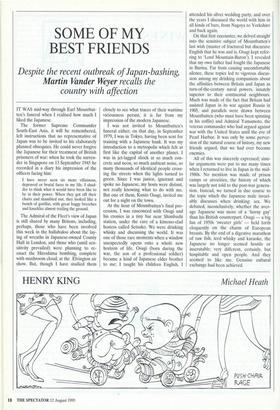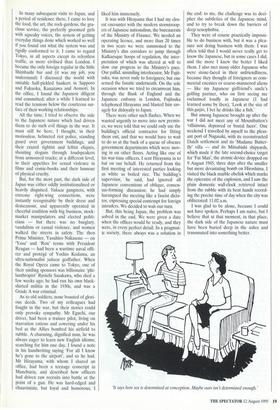SOME OF MY BEST FRIENDS
Despite the recent outbreak of Japan-bashing,
Martin Vander Weyer recalls the
country with affection
IT WAS mid-way through Earl Mountbat- ten's funeral when I realised how much I liked the Japanese.
The former Supreme Commander South-East Asia, it will be remembered, left instructions that no representative of Japan was to be invited to his elaborately planned obsequies. He could never forgive the Japanese for their treatment of British prisoners of war: when he took the surren- der in Singapore on 13 September 1945 he recorded in a diary his impression of the officers facing him:
I have never seen six more villainous, depraved or brutal faces in my life. I shud- der to think what it would have been like to be in their power. When they got off their chairs and shambled out, they looked like a bunch of gorillas, with great baggy breeches and knuckles almost trailing the ground.
The Admiral of the Fleet's view of Japan is still shared by many Britons, including, perhaps, those who have been involved this week in the hullabaloo about the lay- ing of wreaths in Japanese-owned County Hall in London, and those who (until sen- sitivity prevailed) were planning to re- enact the Hiroshima bombing, complete with mushroom cloud, at the Elvington air show. But, though I have studied them closely to see what traces of their wartime viciousness persist; it is far from my impression of the modern Japanese.
I was not invited to Mountbatten's funeral either; on that day, in September 1979, I was in Tokyo, having been sent for training with a Japanese bank. It was my introduction to a metropolis which felt at first like the capital of another planet. I was in jet-lagged shock at so much con- crete and neon, so much ambient noise, so many thousands of identical people cross- ing the streets when the lights turned to green. Since I was junior, ignorant and spoke no Japanese, my hosts were distant, not really knowing what to do with me. But one of them, Kunio Osugi, invited me out for a night on the town.
At the hour of Mountbatten's final pro- cession, I was ensconced with Osugi and his cronies in a tiny bar near Shimbashi station, under the care of a kimono-clad hostess called Setsuko. We were drinking whisky and discussing the world. It was one of those rare moments when a window unexpectedly opens onto a whole new horizon of life. Osugi (born during the war, the son of a professional soldier) became a kind of Japanese elder brother to me; I taught his children English, I attended his silver wedding party, and over the years I discussed the world with him in all kinds of bars, from Nagoya to Yorkshire and back again.
On that first encounter, we delved straight into the sensitive subject of Mountbatten's last wish (master of fractured but discursive English that he was and is, Osugi kept refer- ring to 'Lord Mountain-Baron'). I revealed that my own father had fought the Japanese in Burma. Far from causing uncomfortable silence, these topics led to vigorous discus- sion among my drinking companions about the affinities between Britain and Japan as turn-of-the-century naval powers, innately superior to their continental neighbours. Much was made of the fact that Britain had assisted Japan in its war against Russia in 1905, and parallels were drawn between Mountbatten (who must have been spinning in his coffin) and Admiral Yamamoto, the veteran commander who had argued against war with the United States until the eve of Pearl Harbor. It was only by some perver- sion of the natural course of history, my new friends argued, that we had ever become enemies.
All of this was sincerely expressed; simi- lar arguments were put to me many times when I returned to live in Japan in the mid- 1980s. No mention was made of prison camps or atrocities, the history of which was largely not told to the post-war genera- tion. Instead, we turned in due course to the topic which the Japanese male invari- ably discusses when drinking: sex. We debated, inconclusively, whether the aver- age Japanese was more of a 'horny guy' than his British counterpart. Osugi — a big fan of 1950s 'sweater girls' — held forth eloquently on the charm of European breasts. By the end of a digestive marathon of raw fish, iced whisky and karaoke, the Japanese no longer seemed hostile or inscrutable; very different, certainly, but hospitable and open people. And they seemed to like me. Genuine cultural exchange had been achieved. In many subsequent visits to Japan, and a period of residence there, I came to love the food, the art, the rock-gardens, the gra- cious service, the perfectly groomed girls with squeaky voices, the system of getting everyday things done which worked so well if you found out what the system was and rigidly conformed to it. I came to regard Tokyo, in all aspects except its relentless traffic, as more civilised than London. I became the only foreign regular in the little Shimbashi bar and (it was my job, you understand) I discussed the world with amiable half-pickled bankers in Sapporo and Fukuoka, Kanazawa and Aomori. In the office, I found the Japanese diligent and committed; after a while I learned to read the tensions below the courteous sur- face of their working relationships.
All the time, I tried to observe the side to the Japanese nature which had driven them to do such evil things in the war. It must still be here, I thought, in their motionless, helmeted riot police, standing guard over government buildings, and their crazed rightist and leftist cliques, shouting slogans through loudspeakers from armoured trucks; at a different level, in their appetites for sexual violence in films and comic-books and their humour of physical cruelty.
But, for the most part, the dark side of Japan was either oddly institutionalised or
heivily disguised. Yakuza gangsters, with
extreme right-wing connections, were instantly recognisable by their dress and demeanour, and apparently operated in cheerful coalition with big business, stock- market manipulators and elected politi- cians — but there was no burglary, vandalism or casual violence, and women walked the streets in safety. The then Prime Minister, Yasuhiro Nakasone — on `Yasu' and 'Ron' terms with President Reagan — had been a wartime naval offi- cer and protégé of Yoshio Kodama, an
ultra-nationalist yakuza godfather. When the Royal Opera came to Tokyo, one of
their smiling sponsors was billionaire 'phi- lanthropist' Ryoichi Sasakawa, who died a few weeks ago; he had run his own black- shirted militia in the 1930s, and was a Grade A war criminal.
As to old soldiers, none boasted of glori- ous deeds. Two of my colleagues had fought in the war, but their stories could only provoke sympathy. Mr Eguchi, our driver, had been a trainee pilot, living on starvation rations and cowering under his bed as the Allies bombed his airfield to rubble. A charming, dignified man, he was always eager to learn new English idioms; searching for him one day, I found a note in his handwriting saying Tor all I know he's gone to the airport', and so he had. Mr Hirayama, with whom I shared an office, had been a teenage conscript in Manchuria, and described how officers had driven raw recruits into battle at the point of a gun. He was hard-edged and chauvinistic, but loyal and humorous; I liked him immensely.
It was with Hirayama that I had my clos- est encounter with the modern stormtroop- ers of Japanese nationalism, the bureaucrats of the Ministry of Finance. We needed an operating licence, and more than 20 times in two years we were summoned to the Ministry's dim corridors to jump through Kafkaesque hoops of regulation, the inter- pretation of which was altered at will to slow our progress to the Ministry's pace. Our pallid, unsmiling interlocutor, Mr Fujit- suka, was never rude to foreigners; but one sensed the fanatic underneath. On the sole occasion when we tried to circumvent him, through the Bank of England and the Japanese embassy in London, Fujitsuka telephoned Hirayama and blasted him sav- agely for disloyalty to Japan.
There were other such flashes. When we wanted urgently to move into new premis- es, we were told that we could only use the building's official contractor for fitting them out, and that we would have to wait to do so at the back of a queue of obscure government departments which were mov- ing in on other floors. Acting like one of his war-time officers, I sent Hirayama in to bat on our behalf. He returned from the first meeting of interested parties looking as white as boiled rice. The building's supervisor, he said, had ignored all Japanese conventions of oblique, consen- sus-forming discussion; he had simply harangued the meeting like a fascist dicta- tor, expressing special contempt for foreign intruders. We decided to wait our turn.
But, this being Japan, the problem was solved in the end. We were given a date when the offices would be ready, and they were, in every perfect detail. In a pragmat- ic society, there always was a solution in the end: to me, the challenge was to deci- pher the subtleties of the Japanese mind, and to try to break down the barriers of deep xenophobia.
They were of course practically impossi- ble to do business with, but it was a plea- sure not doing business with them. I was
often told that I would never really get to know the Japanese, but in some cases I did,
and the more I knew the better I liked them. I also met many older Japanese who were stone-faced in their unfriendliness, because they thought of foreigners as com- mercial enemies or coarse-mannered aliens — like my Japanese girlfriend's uncle's
golfing partner, who on first seeing me exclaimed loudly in Japanese (I had learned some by then), 'Look at the size of this gaijin, I bet he drinks like a fish.'
But among Japanese brought up after the war I did not meet any of Mountbatten's
`villainous, depraved or brutal faces'. One weekend I travelled by myself to the pleas- ant port of Nagasaki, with its reconstructed Dutch settlement and its 'Madame Butter- fly' villa — and its Mitsubishi shipyards, which made it the late second-choice target for 'Fat Man', the atomic device dropped on 9 August 1945, three days after the smaller but more devastating bomb on Hiroshima. I visited the black marble obelisk which marks the epicentre of the explosion, and I saw the plain domestic wall-clock retrieved intact from the rubble with its bent hands record- ing the precise time of day when the city was obliterated: 11.02 a.m.
I was glad to be alone, because I could not have spoken. Perhaps I am naive, but I believe that at that moment, in that place, the dark side of the Japanese nature must have been buried deep in the ashes and transmuted into something better.
`It says here sex is determined at conception. Maybe ours isn't determined enough.'



















































 Previous page
Previous page